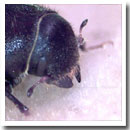The Antifreeze Beetles
DECEMBER 1, 2007 Listen to this Story

- bark beetles
- Enlarge This Image
Web Resources
Although places across the country are feeling the freeze we are, for the most part, experiencing warmer winters and warmer winters, which has led to more bark beetles. Bark beetles are bugs that feast on giant evergreens and other plants and trees. They have a chemical in their body, kinda like antifreeze, that keeps them from freezing to death in bitter cold weather. Barbara Bentz is an entomologist with the U.S. Forest Service has been studying bark beetles for 20 years. Bentz says that the warmer the winter, the more destruction the beetles can do.
- - -
Produced by Marc Sanchez
Barbara Bentz: It's pretty cold work. The tree bark is frozen, and the phloem, just beneath the bark which is where these insects live, is also frozen, as are the insects. They look frozen, but they're not dead. You have to chip off all that really cold stuff, and use tiny, little, metal tweezers to go in to pick out the insects, so you can't really wear gloves.
Desiree Cooper: What's it like in Utah now, this time of year?
Usually we have a lot of snow, although we don't have as much as we normally do. Although, there is a little on the ground right now, so it's pretty cold.
So, the winters are warming up there?
Yes, just like they are everywhere.
What's the effect of the warming winter on those beetles that feed on the bark of trees?
Basically, these insects in their young stage, their larval stage, they're little bags of water. And, the super-cooling point is the temperature where the water in their body will freeze. It doesn't necessarily freeze at zero degrees. They have adapted all kinds of physiological mechanisms for lowering that point -- the temperature at which their body water freezes. And, one of them is by increasing, by metabolizing these compounds -- we call them cryoprotectants. They're basically like the anti-freeze you put in your car. As the temperature begins getting cold in the fall, they metabolize these protectants in their bodies, so their super-cooling point goes lower and lower and lower. We've measured some that can survive as low as -35 degrees Celsius.
What's happening to those beetles now that it's not getting as cold?
There's genetic variation in these populations, so not all individuals can survive at -35 degrees Celsius. But now, as temperatures in the middle of the winter, as well as the fall and spring are warmer, there's more survival in these populations. The temperatures are not going below the point in which the water in their bodies.
Are there particular trees that are susceptible to the beetles?
There are many species in this one genus. The genus is dendrochtenous, and it means tree killer. There's several species in that genus, but there are three or four causing more mortality right now. The Spruce Beetle, which gets into spruce trees. The Mountain Pine Beetle, which gets into all kinds of pine trees. And the Douglas Fir Beetle is another one. And then there's the Ips that gets into pine trees in the southwest. Each species is particular to a specific kind of tree.
Barbara, I have to ask you, why bark beetles and not teddy bears or kitty cats? Why do you study beetles?
It is kind of interesting studying something that most people don't like. Humans do not like to see dead trees, and these insects cause dead trees. I like to remind people that these insects have been in this eco system for a long, long time, and the eco systems have evolved to be a balance. These insects actually help the eco systems, in terms of their functioning -- that whole process of decay, decomposition, and renewal. These insects are a part of that, so they're actually good too.







Comments
Comment | Refresh
Post a Comment: Please be civil, brief and relevant.
Email addresses are never displayed, but they are required to confirm your comments. All comments are moderated. Weekend America reserves the right to edit any comments on this site and to read them on the air if they are extra-interesting. Please read the Comment Guidelines before posting.
You must be 13 or over to submit information to American Public Media. The information entered into this form will not be used to send unsolicited email and will not be sold to a third party. For more information see Terms and Conditions and Privacy Policy.